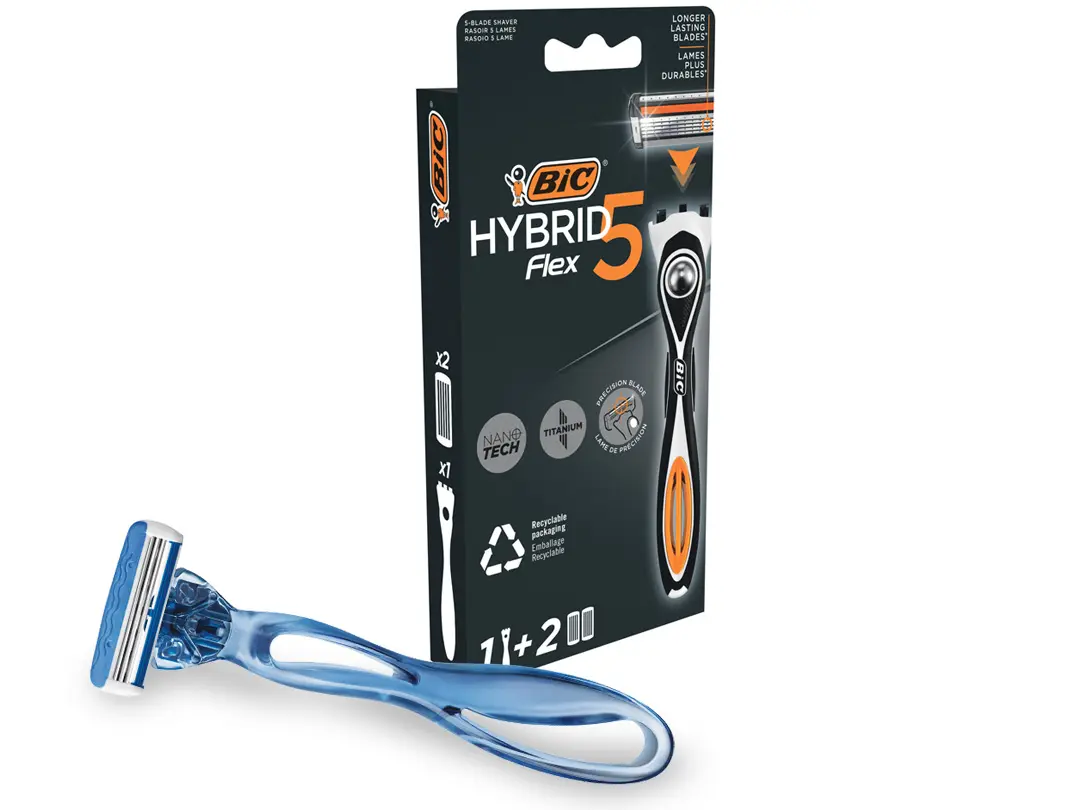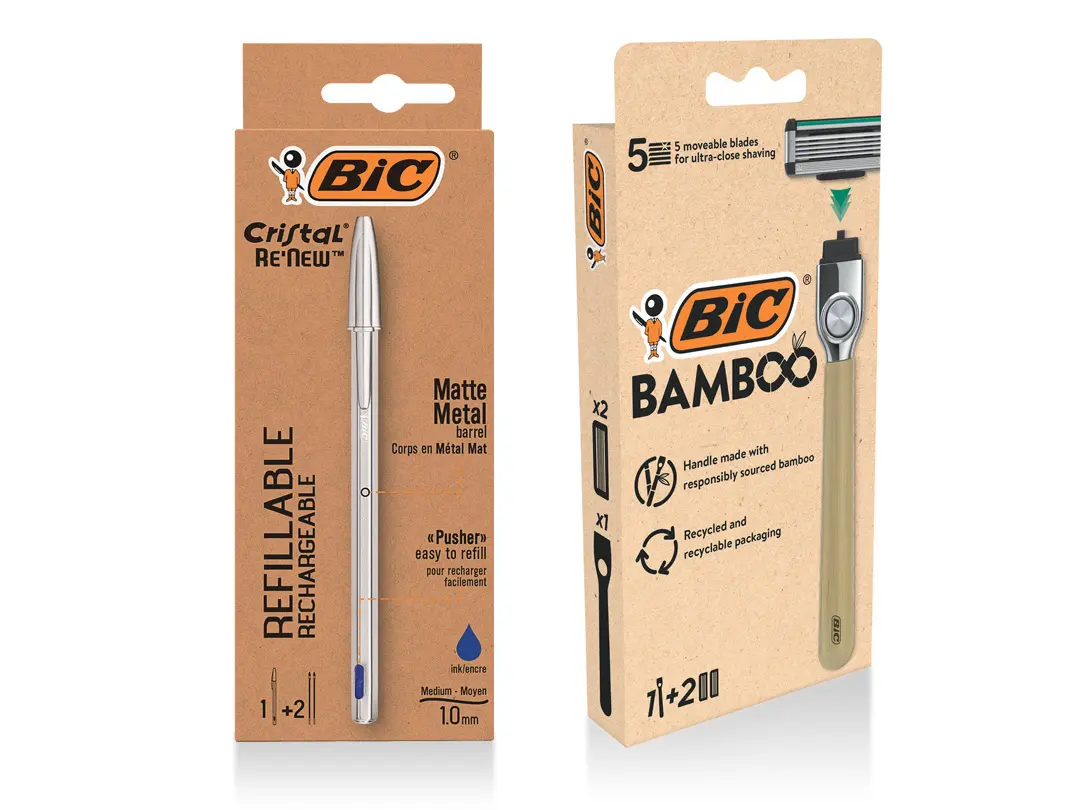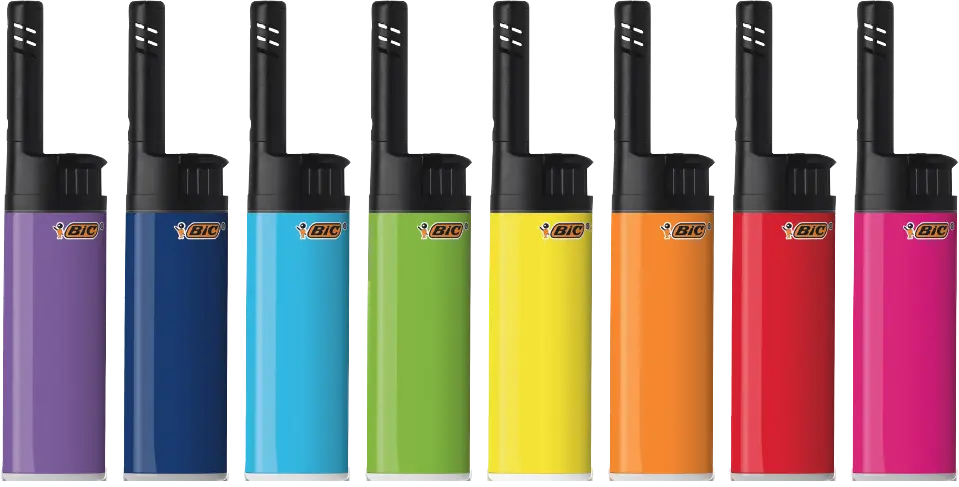Horizon
TURNING HEADWINDS
INTO OPPORTUNITIES
Our Horizon Plan inspires our team members to stretch the boundaries of what BIC can be, and how Consumers can incorporate our Products into their lives.
The Horizon Strategic Plan is focused on a set of initiatives that build on BIC’s strengths, with an intensified focus on consumer needs and sustainability. The goal is not only to amplify the core capabilities that have propelled BIC for the last 75 years, but to go beyond them into adjacent segments to ensure our long-term sustainable growth, profitability, and return to shareholders.
Horizon builds on the Invent the Future transformation plan, which provided the company with a strong foundation to unlock long-term growth. The goal was to build muscle through centralized procurement, a redesigned supply chain, and reinforced core capabilities. With Invent the Future, BIC turned more resilient and equipped to weather the economic and financial disruption of the COVID-19 health crisis.
The Horizon Plan takes a more aspirational view of our three Product Categories in order to help them thrive despite headwinds. The goal is to unlock Category growth by:
- Expanding total addressable markets in fast-growing segments and evolving BIC’s business model to capture an increasing value share of our markets, with a strong focus on execution and return on investments;
- Leveraging innovation capabilities and manufacturing excellence to generate incremental revenues through new routes-to-market;
- Capitalizing on the BIC® brand in our core markets and building on new lifestyles to grow a comprehensive portfolio of consumer-led brands.
THE GOALS
OF HORIZON
Sustainable Development journey to
the next level
strong Free Cash Flow
mid-single-digit Growth
trajectory
solid Return
to Shareholders
Horizon
MOVING “BEYOND”
WITH CONSUMERSʼ LENS
Being Consumer-driven means going beyond our traditional products into new consumer occasions and categories. By thinking differently about our categories and capabilities, we can expand our horizons for growth.
Human Expression
Evolving focus from Stationery to “Human Expression”, moving beyond Writing Instruments into Creative and Digital Expression.
Blade excellence
Growing our one-piece Shavers business with sustainable products, and capitalizing on our “Blade Excellence” assets to become a high-precision blade manufacturer to power other brands.
Flame for life
Expanding Lighters to “Flame For Life” to focus on all lighting occasions, and a more value-driven model.

“ Invent the Future was about setting the foundations for BIC’s long-term growth by reorganizing the company. Horizon is about putting bricks on that concrete foundation. ”
Innovation
ANTICIPATING
CONSUMERS’ DEMAND
The role of innovation is to drive sustainable and profitable growth through new and surprising technologies. BIC is harnessing the Internet of Things and Artificial Intelligence to capture in real time how consumers are using our products. This gives us insights on how the products could better meet their needs and desires.

Avient: an example of Consumer-centric sustainable innovation
Hybrid shavers are an example of how BIC is putting sustainable innovation into action. Working with Avient, a founding member of the Alliance to End Plastic Waste, we have developed a new version of the BIC Click® Soleil 5 for women, with a new recycled material incorporated into the handle. The new shaver combines Avient’s reSound R TPE with a transparent plastic with 40% recycled content. The product meets a growing consumer demand for high-quality refillable razors with a reduced impact on the environment.
ACCELERATING SUSTAINABLE AND CONSUMER-DRIVEN INNOVATION
R&D teams are working on how to develop products desired by consumers and examples of their research include:
- development of technologies to allow sustainable manufacturing process, and reduced overall CO2 factoriesʼ footprint;
- development of solutions for increasing durability and extending coloring products’ life in Stationery;
- development of innovative features in Shaversʼ products, aiming in excelling in shaving performance;
- development of sustainable solutions by designing refillable products with the minimum amount of material.
Key innovations in 2021
- In April, we launched ReVolution, the first full range of eco-friendly Stationery products, such as high-quality, long-lasting ball pens, mechanical pencils, permanent markers and correction tape, each composed of at least 50% recycled plastic.
- Also in April, we launched in Europe the BIC® Cristal® Re’New™.
This rechargeable metallic Cristal® Ballpoint Pen completes BIC’s iconic Cristal® range, offering a metal body, and a recycled plastic cap. - The BIC® BAMBOO shaver was launched in July. This five-blade Hybrid Flex 5® with a movable head has a handle made from responsibly sourced bamboo.
- Also in July, we brought our range of hybrid razors – the Hybrid 5 Flex® for men and the Click® 3 Soleil for women – to Europe. Both products come in 100% recyclable cardboard packaging.

An open innovation eco-system
Collaboration is a key element of our innovation strategy. We have entered into partnerships in order to gain access to new capabilities and to accelerate development of the next generation of BIC® products.
Our partnership with Plug & Play, the largest global innovation platform for startups and corporations and a member of the Alliance to End Plastic Waste gives BIC access to a wide range of startups and talent. It also enables BIC to stay on top of new trends and accelerate our creation of new sustainable products to meet rapidly changing consumer needs.
The Data-Driven Invention Lab is another example. We are working with the technology company Iprova to gain early insights on technologies and trends and to integrate them into our innovation pipeline. Using Iprova’s machine learning-based, data-driven approach to invention, the Lab helps BIC anticipate and answer rapidly to changing consumer needs with inventions using Iprova’s technology.
In 2021, 8.1% of BIC’s Net Sales came from innovation introduced in the last three years.

“ In 2022 we will double down on our focus areas in innovation to find new ways to surprise and delight the customers, always exceeding expectations. ”
Industry & supply chain
STRENGTHENING
OUR SUPPLY CHAIN
BIC’s end-to-end Global Supply Chain is designed to generate business value and to create a competitive edge for BIC. It is the engine driving the company’s transformation to a consumer-centric company.
Throughout 2021 the pressures on our Supply Chain intensified, including rising Energy costs, shortages of Raw Materials, higher Shipping costs, and historically high prices for Packaging and Metals. In the face of these obstacles, our Supply Chain proved resistant and we kept our factories open.
ACHIEVEMENTS
Steps taken in 2021 to reduce uncertainties and guarantee the supply chain:
- To meet rising input costs, we launched a hedging program that mitigates the resulting price hikes for plastics; this resulted in a savings of around €2.5 million in 2021.
- We strengthened our relationships with strategic suppliers in a number of ways:
- by intensifying internal and external risk assessment;
- by establishing a centralized point of contact with them;
- and by offering long-term commitment and greater visibility – up to three years – on orders in exchange for guaranteed availability of supplies.
- To reduce pressure on our factories, we set a goal to lower by 20% the amount of single sourced materials.
- We worked to speed up certification of materials.
- We set up savings initiatives that includes organizing tenders with business partners to reduce operating costs, and challenging the demand – design-to-cost exercise – for greater cost efficiency.
sea
freight
Rising shipping costs remained a major challenge for manufacturers everywhere. The COVID-19 pandemic caused a shortage of containers, with demand far exceeding the capacity offered by shipping lines. The result: higher shipping costs as BIC and other companies competed for limited spaces on board containers to secure their supply chains.
€20 million
savings from value capture
program that tracked
600 projects
Industry & supply chain
SIGNIFICANT PROGRESS
IN SUSTAINABLE
PROCUREMENT
The destabilization of the Supply Chain accelerated aspects of our Sustainable Development Program. The shortage of regular Plastics, for example, validated our decision to partner with Avient for Recycled Plastics or other Sustainable Materials. We transformed a crisis in Materials into an opportunity to advance on Sustainable Procurement.
ACHIEVEMENTS
Steps taken in 2021 for a more sustainable supply chain:
- Reassessed BIC’s “strategic suppliers”;
- Launched Phase 2 of Lightersʼ study in 9 key markets with 26 suppliers in order to obtain full transparency on the whole Supply Chain;
- Initiated a study to reduce Scope 3 CO2 emissions from suppliers which represent two thirds of BIC’s emissions;
- Upgraded our renewable electricity target, committing to achieve 100% by 2025.
The challenges ahead
To meet 2022 challenges, we have set four priorities:
Profitability: the goal is to outperform the market by reducing operating costs and mitigating price increases through “demand management”.
Reliability: increase dual sourcing, strengthen relationships with suppliers.
Sustainability: look for more innovative suppliers and extract more innovation from existing suppliers.
Supporting the company’s M&A activity: integrating the suppliers for BIC’s two major acquisitions in 2020 (Rocketbook and Djeep).
SUPPLIER DIVERSITY
PROGRAM
2021 saw the kick-off of the US supplier diversity program (a proactive business program that encourages the use of businesses owned by women, minorities, veterans, the disabled, LGBT, as well as small businesses). The program aligns with our Horizon strategy by delivering growth through Consumer Centricity and rapid innovation; it is a way to gain access to a whole new network and a larger pool of qualified suppliers/contractors for cost savings, higher quality products, and services.
commercial excellence
RAISING THE BAR
Horizon is a strategy that focuses on accelerating and winning in the growing segments, channels, and markets, where consumersʼ desires and habits are changing. Built on a stronger and agile commercial operation, Horizon raises the bar of commercial excellence to drive BIC’s growth and profitability.
Three components drive our commercial transformation: Omnichannel distribution, Revenue Growth Management and Portfolio Management.
Omnichannel distribution
Today BIC consumers buy our products both offline and online. Through its Omnichannel strategy, BIC is creating a seamless online/offline shopping experience.
The investments we have made in e-commerce over the past two years are paying off: we achieved our e-commerce Net Sales target of 10% of our business ahead of our 2022 commitment, including Rocketbook.
Our core e-commerce sales grew 21% in 2021, and BIC holds leading positions online in all three product categories.
REDUCING
complexity
Two years ago, we began reducing our SKUs (stock keeping units) in Brazil; in 2021, we expanded the program globally. Reducing SKUs has three benefits: it solves the paradox of choice for the consumer; it improves space utilization on shelf, in warehouses and in transit; and it reduces our own manufacturing, warehousing, and shipping complexity and costs. In 2022, we will continue to eliminate some while adding other new products, for a net reduction.
Revenue Growth Management
This is a data-based analytical approach to pricing, improved promotional efficiency, scaled personalization, and reduced internal complexity.
It means using surgical pricing and selecting promotions that provide real value creation for the company and its customers. We have removed inefficient promotional spending, leading to a higher average selling price and increasing product gross profit, while actually increasing sales momentum.
Portfolio management
BIC’s portfolio management approach: allocate resources, change business models in lower potential markets and focus on profitability in mature markets.
- Targeting Invest to Grow geographies, such as Morocco and Nigeria, where BIC can grow in all categories.
- Supporting these markets with incremental advertising and brand support to drive brand awareness and conversion.
- Investing in distribution and go-to-market drivers.
- Identifying markets to exit completely or change the business model.
60 to 70%
countries in which
we held or gained market
share across our
three divisions
21%
growth
of e-commerce sales

“ By raising the bar of Commercial Excellence, we will drive growth for our brands and ensure profitability and improvement in cash flow. ”
Sustainability
AT THE CORE OF
EVERYTHING WE DO
Sustainable development has guided BIC’s approach to doing business for nearly twenty years. Our “Writing the Future, Together” program established five major commitments to acting as a responsible company, and limiting our environmental footprint.
Sustainability is a key element of our business model, underscoring all our activities and decisions. We are determined to reduce the environmental and societal footprint of our products and operations; this means a complete transformation of our approach to plastics. For BIC, doing business means respecting ethical principles and human rights in the workplace, and operating with integrity. We believe in providing our team members with a safe workplace, extending our responsible approach throughout our supply chain and investing in education. As a corporate citizen, we support the local communities where we operate. Through these and other actions, we strive to constantly improve our performance and help write a sustainable future for all. In December, BIC joined the United Nations Global Compact, the world’s largest corporate sustainability initiative.
By adopting the UN Global Compact’s ten principles on human rights, labor, environment, and anti-corruption, BIC reaffirms the critical role that Sustainability has played in helping shape the company’s long-term success.

RECYCLING RAZORS
IN SPAIN

We have expanded our long-term partnership with TerraCycle® with the first free razor recycling program in Spain. Through this program, launched last July, BIC and TerraCycle® collect razors across the Spanish mainland and recycle them into soap holders or other toiletries to support the development of the circular economy for both the country and the company. BIC has worked with TerraCycle®, a world leader in the treatment of hard-to-recycle waste, since 2011. As a result of this partnership, BIC and TerraCycle® have recycled more than 64 million stationery items in Europe, the United States, Australia and New Zealand.
FOSTERING SUSTAINABLE INNOVATION IN BIC® PRODUCTS
Simple, inventive designs, with less raw materials and long-lasting performance: Sustainable Development is embedded into BIC® products starting from the design phase.
2025-2030 commitments
- By 2025, the environmental and/or societal footprint of all BIC® products will be improved.
- By 2025, 100% of consumer plastic packaging will be reusable, recyclable, or compostable.
- By 2030, we will use 50% non-virgin petroleum plastic or alternatives in our products.
2021 key achievements and results
- We use EMA(1) in all innovation projects to evaluate products’ environmental and societal impacts.
- The Environmental or societal performances of 12 products were improved.
- The tool for assessing and improving CSR packaging performance was finalized and integrated into the operational models. All new innovation programs were evaluated.
- 16 products labeled NF Environment.
(1) Environmentally & socially measurable advantage.
% of recycled/alternative plastics in BIC® products
(% of volumes purchased)
% of reusable, recyclable or compostable plastic packaging
ACTING AGAINST CLIMATE CHANGE
We deploy a global approach to energy consumption (energy efficiency, use of renewable energy, etc.) based on a Group roadmap and local choices.
2025 Commitment
By 2025, BIC will use 100% renewable electricity.
2021 key achievements and results
- In 2021, 79% of electricity came from renewable sources.
- Our future headquarters in Clichy (France) will be certified BREEAM (Building Research Establishment Environmental Assessment Method), meeting the highest requirements for environmental performance and energy efficiency.
- BIC was awarded an A- leadership 2021 CDP score on Climate Change.
% of electricity from renewable sources
Total annual greenhouse gas (GHG) emissions
(scope 1 + scope 2 market based)
in teqCO2
THE 4 Rs – reduce, recycled, refillable, Recyclable – applied to BIC® Products
In 2021 we launched several innovative products with environmental benefits, moving a step forward to reducing our overall carbon footprint.
Use Recycled or alternative materials
- BIC USA launched BIC® ReVolution, a full range eco-friendly Stationery line made of at least 50% recycled plastic. The BIC® ReVolution Ocean Retractable Ball Pen comprises 73% recycled ocean-bound plastic.
- The BIC® BAMBOO five-blade Hybrid Flex 5® shaver with a movable head has a handle made from responsibly-sourced bamboo. BAMBOO comes in 100% recyclable cardboard packaging made of 50% recycled paper, including refills in 95% recycled paper packaging.
- We introduced our new Hybrid shaver range in Europe. Made with recycled plastic handles and with recyclable packaging, this range was deployed in North America and Latin American in the third quarter.
Design and manufacture Refillable products and packaging when possible
- The BIC® Cristal® Re’New™, our first rechargeable metallic Cristal Ball Pen, was introduced in Europe in January. This refillable premium ball pen completes BIC’s iconic Cristal® range, offering a metal body and a recycled plastic cap.
Design and manufacture Recyclable products and packaging
- Almost all our packaging comes from recycled sources. In Lighters, we have started, production of full cardboard and cellulose packaging: trays and multipacks, with an environmental impact reduced by 1/3.
COMMITTING TO A SAFE WORK ENVIRONMENT
The Group is committed to the safety, health and well-being of its team members.
2025 Commitment
By 2025, BIC aims for zero accidents across all operations.
2021 key achievements and results
- Roll-out of the safety culture to sales teams
- Reinforcement, with a health and safety dimension, of the due diligence processes in merger and acquisition procedures
- Integration of the HSE aspect into BIC’s new team member onboarding process
PROACTIVELY INVOLVING SUPPLIERS
Being a responsible company requires control of our entire value chain. Our purchasing team analyzes all risks and selects and collaborates with our most strategic suppliers on implementing a responsible approach.
2025 Commitment
By 2025, BIC will work responsibly with its strategic suppliers to ensure the most secure, innovative and efficient sourcing.
2021 key achievements and results
- Integration of 52.3%(1) of strategic suppliers of the responsible purchasing program
- Training on the environmental and social impacts of supply chains and responsible purchasing practices for purchasing teams
- Value chain analysis of 9 raw materials and 26 suppliers resulting in the identification of supply areas at risk
- Consultations with over 30 relevant stakeholders to identify actions to leverage a more responsible supply chain
- Identification of risk reduction solutions for each material category (metal, gas and plastic)
(1) Excluding Cello, BIC Graphic, new acquisitions and certain OEMs.
IMPROVING LIVES THROUGH EDUCATION
Because education has the power to change the world, it has always been at the heart of the Group’s concerns.
2025 commitment
By 2025, BIC will improve learning conditions for 250 million children, globally.
2021 key achievements and results
- Learning conditions improved for more than 158 million children since 2018
- 73% of philanthropic contributions promoted education
Sharing value
with all
stakeholders
In March, BIC launched an innovative €40 million ESG Impact Share Buyback Program. This program is consistent with BIC’s mission to create and share value with all stakeholders. The outperformance is allocated to the Abdul Latif Jameel Poverty Action Lab’s (J-PAL) tutoring and parental programs in Europe and the US, and, to the BIC Corporate Foundation for Education.
LIGHTERS’ SUSTAINABILITY
program

Innovation and exploration drive sustainable development in the Flame for Life division.
Our approach is based on the following principles:
- adopting a science-based approach;
- exploring new avenues and questioning all options;
- considering social and environmental impacts;
- promoting open dialogs and partnerships.
At each stage of the life cycle of our lighters, we are transforming internal practices, thus addressing three major issues: climate change, resource depletion and plastic pollution.
We regularly launch new pilot projects, which evolve as we receive feedback and obtain satisfactory scalable results.
TEAM MEMBERS
A REINFORCED
COMMITMENT
TO DIVERSITY, EQUITY
& INCLUSION
BIC’s Diversity, Equity, and Inclusion (DE&I) Policy expresses our Commitment to being an equal opportunity employer and maintaining a workforce that reflects the diversity of the communities in which we live and operate.
Promoting a culture of inclusion
At BIC, we consider cultural and individual diversity an essential element of team culture. We try to ensure that our teams reflect as closely as possible the diversity of the Group’s customers and consumers around the world. We welcome them and give them a sense of responsibility through a culture of inclusion founded on practices of responsible leadership and management. And we encourage the diversity and dynamism of our teams as drivers for innovation and a key factor for our success.
DE&I values drive BIC’s training, promotion, and recruitment policies.
In 2021, we took a number of initiatives to further our role as an agent of positive change. In January 2021, Gonzalve Bich joined the “CEO action for diversity and inclusion™”, the largest CEO-driven business commitment of its kind. By taking this pledge, Gonzalve Bich is committing to take action to ensure the company’s culture celebrates and welcomes diverse perspectives and experiences and encourages open conversations about DE&I.
“SHARING
HORIZON”
In the spirit of sharing value with all
team members, BIC launched its “Sharing
Horizonˮ Employee shareholding plan.
With “Sharing Horizonˮ, all BIC team members have been granted 5 shares. With this plan, BIC acknowledges the critical role team members play in the success of the achievement of Horizon plan.
Our global Diversity Equity & Inclusion (DE&I) strategy has set a series of strategic objectives and KPIs to measure our progress in the areas of belonging, attraction, promotion and influence:
BELONG
Goal
Set a baseline for the inclusion metric as measured through quarterly pulse surveys
Achievement:
- 2 pulse surveys were launched measuring Engagement, Inclusion, Trust, and Manager Effectiveness.
Results were shared with all business units which have developed action plans to address key areas of opportunity with regular updates to our team members in Global and Regional Town Halls. - Our Allyship program continues to grow with almost 100 team members around the globe volunteering to help roll out the Group’s DE&I strategy.
They organize local events to celebrate Regional and International Diversity days such as International Women’s Day, Pride Month, World Day for Cultural Diversity for Dialogue and Development. - Launch of mandatory Inclusive Leader learning journey for General Managers, Plant Managers, Directors and above.
- Two more courses will be launched in 2022 on “Being an Inclusive Leader” and “Building an Inclusive Culture”.
ATTRACT
Goal
Increase the number of mid-management women and other underrepresented minorities through promotions and new assignments
Achievement:
- Partnership with a female-owned consultancy firm to facilitate a series of listening sessions with 70 women in 22 countries. The program provided valuable insights into the challenges our female team members face and the necessary changes in career development, wellness programs and manager training.
PROMOTE
Goal
Increase female representation in Director and above positions to 40% in 2027
Achievement:
- Continued focus on delivering a gender balanced slate of candidates in mid-management and above position with 44% of all hires being females.
- Participation in the Black Leadership Academy, led by McKinsey & Company, to support black executives and leaders around the world. It comprises two distinct programs:
- the Black Executive Leadership Program, which is designed for targeted managers and takes the form of facilitated small group discussions.
- a Management Accelerator that targets leaders at the beginning or middle of their career.
INFLUENCE
Goal
Improve involvement in external organizations to show our commitment to DE&I
Achievement:
- Participation in the “Break the Ceiling Touch the Sky®” summit in New York and Dubai, which offered companies an opportunity to learn DE&I best practices and connect with women leaders from around the world.
- Senior Leader involvement and speaking engagements in Network of Executive Women, Break the Ceiling Touch the Sky® and Enactus.
TEAM MEMBERS
DIVERSITY EQUITY & INCLUSION (DE&I)
REGIONAL ALLIES

“ When employees feel good where they are and can be who they really are, they bring out the best of themselves, whether in their personal or professional lives. We work with people, and they are very important for the sustainability of our business. Seeing the sparkle in our people’s eyes is what motivates me! ”

“ Being more diverse and inclusive allows us to widen our comprehension of new trends and societal issues, accelerating innovation and enhancing our relevance in the consumers’ view. ”

“ Getting all team members to support diversity was initially a challenge. The first conversations gave me insights which I used to raise awareness. I could then network and participate in internal and external DE&I activities. ”

“ In 2021, BIC clearly prioritized DE&I initiatives, and the result is a company culture which is truly inclusive. The Allyship Team was very active and committed to developing programs and monthly diversity initiatives, such as MLK Day, Black History, Women’s History, Hispanic Heritage, Juneteenth, Veteran’s Day, Pride Month and National Immigrants Day. ”
